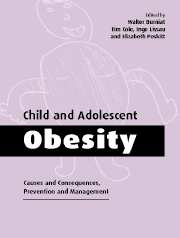Book contents
- Frontmatter
- Contents
- List of contributors
- Foreword
- Preface
- Part I Causes
- Part II Consequences
- Part III Prevention and management
- 12 Prevention
- 13 Home-based management
- 14 Dietary management
- 15 Management through activity
- 16 Psychotherapy
- 17 Drug therapy
- 18 Surgical treatment
- 19 Interdisciplinary outpatient management
- 20 Interdisciplinary residential management
- 21 The future
- Index
16 - Psychotherapy
Published online by Cambridge University Press: 02 November 2009
- Frontmatter
- Contents
- List of contributors
- Foreword
- Preface
- Part I Causes
- Part II Consequences
- Part III Prevention and management
- 12 Prevention
- 13 Home-based management
- 14 Dietary management
- 15 Management through activity
- 16 Psychotherapy
- 17 Drug therapy
- 18 Surgical treatment
- 19 Interdisciplinary outpatient management
- 20 Interdisciplinary residential management
- 21 The future
- Index
Summary
Obesity – a disease put into perspective
Obesity itself is not usually regarded as an eating disorder, although sometimes obesity and eating disorders (commonly binge eating) coexist. The prevalence of eating disorders in association with obesity used to be thought as high as 20–50% of those seeking help for their obesity, but recent studies of adolescents enrolled into an obesity programme suggest a prevalence of around 7% of obese (Decaluwè et al., 2000). The reason for this difference is that diagnostic interviews do not confirm the findings of earlier questionnaires (Stunkard et al., 1996; Ricca et al., 2000). Further, amongst obese children in the general population and not seeking help for their obesity, the prevalence of eating disorders may be even lower. However, we do not propose to discuss the use of psychotherapy in the treatment of eating disorders here. This chapter is concerned with how psychotherapy can be used more generally for the understanding and treatment of obesity. Psychotherapy is one tool for achieving the lifestyle changes necessary to counteract strong genetic influences on the development of obesity.
The multifactorial causes of obesity demand lifestyle changes which can only be achieved through a combined approach using many different treatment components, for example combining advice on exercise and diet, training in social skills, even drug treatment in the most severe cases.
Psychosocial aspects of society
Psychosocial factors are certainly important in childhood obesity, although the extent to which they are relevant varies with the population selected and the differences in environmental support provided by family and peers.
- Type
- Chapter
- Information
- Child and Adolescent ObesityCauses and Consequences, Prevention and Management, pp. 327 - 344Publisher: Cambridge University PressPrint publication year: 2002
- 8
- Cited by



